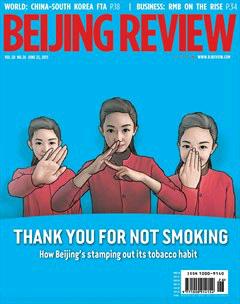Will the New Ban Go Up In Smoke?
A new smoking ban—Chinas toughest to date—took effect in Beijing on June 1. The new ban prohibits smoking in all of the citys indoor public places, workplaces, and on public transportation. Additionally, the regulation bans smoking at outdoor public locations such as schoolyards.
Owing to its past popularity and iconic status, smoking has influenced Chinese peoples daily lives in a number of different, often subtle, ways. Will the new regulation cause the habit to fade from public life?
Statistics from the National Health and Family Planning Commission in 2014 showed that as the worlds largest tobacco producer and consumer, China has more than 300 million smokers. Over 740 million non-smokers are exposed to secondhand smoke annually. More than 1.36 million people die of smoke-related diseases every year, about 100,000 of which are non-smokers who have fallen victim to second-hand smoke. If no effective measures are taken, it is projected that over 3 million people will die of smokerelated diseases every year by 2050.
Effectively enforcing a ban on smoking in public places has long been a hot issue for authorities. China started to implement smoking bans of various kinds as long ago as 1979. Since then, the country has been imposing smoking bans in more and more public places and detailing more and more regulations on prohibiting smoking at specific locations. Today, nearly 50 percent of Chinese cities have banned smoking in public places. These measures, however, have failed to have the desired effect.
Beijing had previously introduced two smoking bans in late 1995 and May 2008. However, these bans were never enforced in earnest. Many smokers persisted in smoking in public places, even those sporting “No Smoking” signs.
A certain kind of subculture has arisen from this individual habit, one of the reasons it is so difficult to ban. Smoking and drinking are an indelible part of Chinese social activities, owing to the value of the habits as social lubricants and their ability to create an instant bond between those who partake of them. Moreover, tobacco has become an essential cash crop in many localities in China, the prime reason that local governments are reluctant to prohibit smoking outright.
The new regulation seems to have worked more effectively this time, owing to strong enforcement and widespread media coverage. Within the 15 days after it took effect, inspectors fined three organizations in Beijing a total of 6,000 yuan($968) for not adequately implementing smoking control measures.
Tough regulations, strong enforcement and the participation of the public are all essential to building a smoking-free environment. If Beijings new regulation works this time around, then the pace of progress in reducing smoking throughout the whole of China will undoubtedly quicken.

